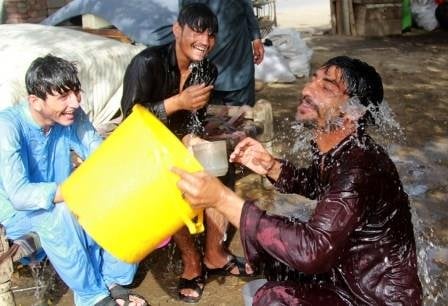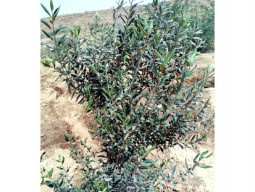
The increased loadshedding and numerous power outages added to the misery of the people, forcing them to take to the streets to vent their anger. A pregnant woman died in Hyderabad while protesting against persistent load-shedding.
Sunday’s temperature surpassed previous day’s reading at 41°C, meteorologists said.
The sweltering heatwave in the city and elsewhere in Sindh is likely to extend its unwelcome stay by four to five days, they said.
The heatwave is expected to peak between Monday and Wednesday, drastically pushing the temperatures even higher, Dr Ghulam Rasool, director-general at the Pakistan Meteorological Department (PMD), said.
Heatwave warning issued
Interior parts of Sindh can expect temperatures reaching up to 50°C as a renewed heatwave envelopes the province, he warned.
The official attributed the soaring temperatures to a halt in sea breeze which allowed the heatwave — that rode into the city on Saturday — to continue for four days.
Meanwhile, deadly heatwaves are going to be country's much bigger socio-economic and health problem in the coming decades, particularly in densely populated urban areas of the country.
The global warming-induced extreme weather events are becoming more frequent and occurring over a much greater portion of the country.
Climate change ministry spokesperson Mohammad Saleem said, "But devastating fallouts of heatwaves on humans can be largely mitigated through timely and effective responsive measures."
He said that extreme heatwaves such as the one presently torching the various cities and towns of the country are frequently cited as one of the most direct effects of global warming-induced climate change.
Saleem said that Pakistan is most likely to suffer more frequent and intense heatwaves as the average temperatures in the country are constantly increasing. Heatwaves matter because they kill large number of people through heat stress, cause forest fires, reduce crop yields and damage ecosystems, which are not adapted to high temperatures, he added.
The media spokesperson said that the World Meteorological Department's reports show that annual average temperature in the country has jumped up by roughly 0.5°C, which has led to five-fold rise in heatwave days over last 30 years. Besides, the country's annual temperature is well on path to rise by 3°C to 5°C due to a heat-trapping global carbon emission.
Karachi swelters as power supply wavers
"Such dangerously rising trends in temperatures will potentially continue to cast various negative effects on the country's human health, spike frequency and intensity levels of extreme weather events including heatwaves, cloudbursts, floods, glacial melt, agricultural productivity, water availability, coastal erosion and seawater incursion," Saleem highlighted.
He added humans are adapted to body temperatures of around 37°C. If humidity - the levels of water vapour in the air - goes up with the thermometer, then people caught in a zone of extreme heat cannot adjust body temperatures by perspiration. “With every 1°C rise in temperatures, the capacity of the air to hold moisture goes up by 7 per cent. People with no access to air conditioning or a cool breeze become, however, at high risk,” he added.
Quoting a study published last year in the Nature Climate Change Journal, he said that one in three persons is vulnerable to heatwave-related health impacts globally. “But by the year 2100, three out of four people on earth could be subject to at least 20 days per year of heat and humidity associated with deadly heatwaves, if carbon emissions from industries, transport…agriculture continue to rise at their current rates,” he added.
Heatwave likely to last for next six days in Karachi, warns PMD
Saleem said that according to the study's findings based on data of about 783 heatwave incidents in 164 cities from 36 countries indicate that about 30% of the world's population (and about 13% of the land area) experiences at least 20 days per year on which the deadly threshold is reached.
He pointed out that even though humans aggressively cut back on these carbon emissions, such as outlined in the Paris climate agreement, increasing temperatures and humidity levels would combine to ratchet up the intensity and frequency of deadly heatwaves in various countries including Pakistan, India, and Afghanistan.
Nonetheless, the good news is that heatwaves are quite predictable, and "extreme temperature early action systems as being practiced in Karachi have proven that they can save lives in the heatwave-vulnerable areas of the country, Saleem said.
"By expanding early heatwave warning systems in heatwave-prone areas of the country, authorities can boost their ability to prevent a lot of suffering, illness, and death from heatwaves through timely response and preparedness," he added.
Saleem suggested that that building capacity of individuals and communities to respond to the heat stress during heatwaves by raising heat health awareness campaigns in the country before the onset of heatwaves season can be of great help to cope with the fallouts of the heatwaves on the health of people.
Saleem also underlined the need for district-wise heatwave management plans comprising measures including no or reduced power outages, sustained provision of water, healthcare facilities in hospitals and establishment of roadside public shades to stave off human losses from their impacts.
[With additional input from News Desk]
1719315628-0/BeFunky-collage-(8)1719315628-0-405x300.webp)


1731329418-0/BeFunky-collage-(39)1731329418-0-165x106.webp)













COMMENTS (1)
Comments are moderated and generally will be posted if they are on-topic and not abusive.
For more information, please see our Comments FAQ